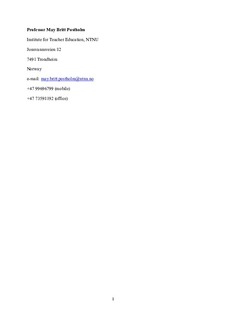| dc.contributor.author | Postholm, May Britt | |
| dc.date.accessioned | 2019-03-14T09:54:04Z | |
| dc.date.available | 2019-03-14T09:54:04Z | |
| dc.date.created | 2018-10-23T23:12:36Z | |
| dc.date.issued | 2018 | |
| dc.identifier.citation | Educational Research. 2018, 1-18. | nb_NO |
| dc.identifier.issn | 0013-1881 | |
| dc.identifier.uri | http://hdl.handle.net/11250/2589966 | |
| dc.description.abstract | Background: Research findings indicate that developing good relationships with pupils, managing classroom processes adequately and developing confidence and trust with other teachers are among the aspects of teaching that are found to be challenging. Although many studies conclude that collaborative reflection is a crucial activity for supporting teachers’ professional development in school, studies that focus on what teachers reflect on and how they reflect are more limited.
Purpose: The purpose of the study was to improve our understanding of what situations teachers experience as challenging in their teaching, what types of help they seek when trying to manage such situations and, furthermore, how teachers reflect together on how to develop as teachers, when they have time to collaborate.
Sources of information and method: The study aimed to explore these areas theoretically by bringing together data from, and discussing the implications of (1) an interview study and (2) a formative intervention study which involved teachers from lower secondary schools in Norway working with a researcher–participant. The data were analysed by using the constant comparative method of analyses. By discussing aspects of these two studies together, the research aimed to identify and address some of the theoretical questions pertinent to teacher development.
Findings and conclusions: The analysis and discussion of the data from the two studies illuminates teachers’ recognition of the value of having time to reflect together. It also indicates, however, that it is not only a matter of teachers having time to observe, reflect together and focus on their development processes: the types of discourse used during collaborative reflection must also be suitable. The researcher–participant’s role highlighted the untapped potential to be found by looking into how language is used in dialogues aimed at supporting teacher development. Helping teachers to develop the skills to reflect collaboratively and constructively, in a way that ultimately improves teaching and learning, is therefore an important challenge for teacher education and the education of teachers and school leaders. | nb_NO |
| dc.language.iso | eng | nb_NO |
| dc.publisher | Taylor & Francis | nb_NO |
| dc.title | Reflective thinking in educational settings: an approach to theory and research on reflection | nb_NO |
| dc.title.alternative | Reflective thinking in educational settings: an approach to theory and research on reflection | nb_NO |
| dc.type | Journal article | nb_NO |
| dc.type | Peer reviewed | nb_NO |
| dc.description.version | acceptedVersion | nb_NO |
| dc.source.pagenumber | 1-18 | nb_NO |
| dc.source.volume | 60 | nb_NO |
| dc.source.journal | Educational Research | nb_NO |
| dc.source.issue | 4 | nb_NO |
| dc.identifier.doi | https://doi.org/10.1080/00131881.2018.1530947 | |
| dc.identifier.cristin | 1622935 | |
| dc.description.localcode | Locked until 23.4.2020 due to copyright restrictions. This is an [Accepted Manuscript] of an article published by Taylor & Francis in [Educational Research], available at https://doi.org/10.1080/00131881.2018.1530947 | nb_NO |
| cristin.unitcode | 194,67,80,0 | |
| cristin.unitname | Institutt for lærerutdanning | |
| cristin.ispublished | true | |
| cristin.fulltext | original | |
| cristin.qualitycode | 2 | |
